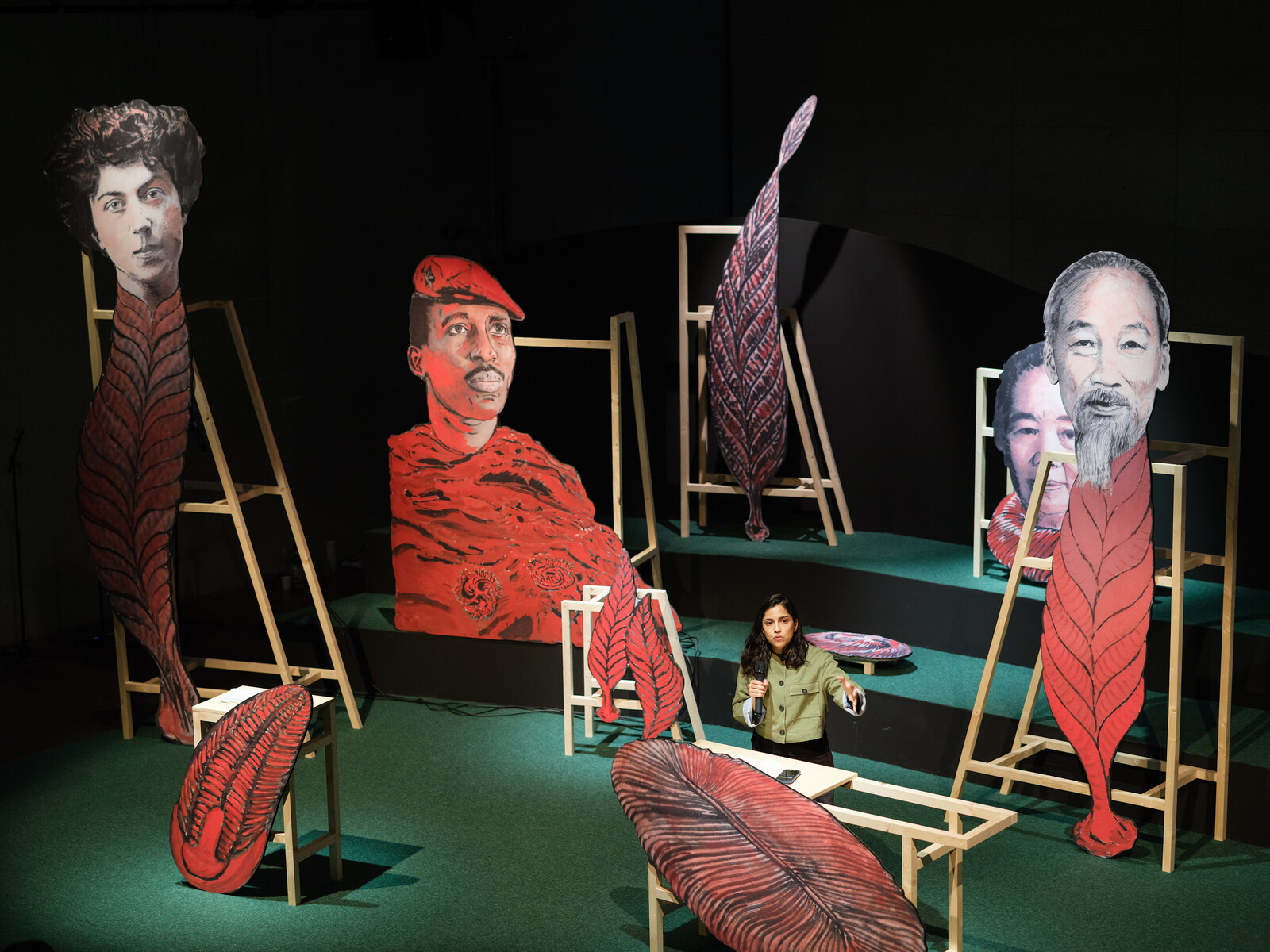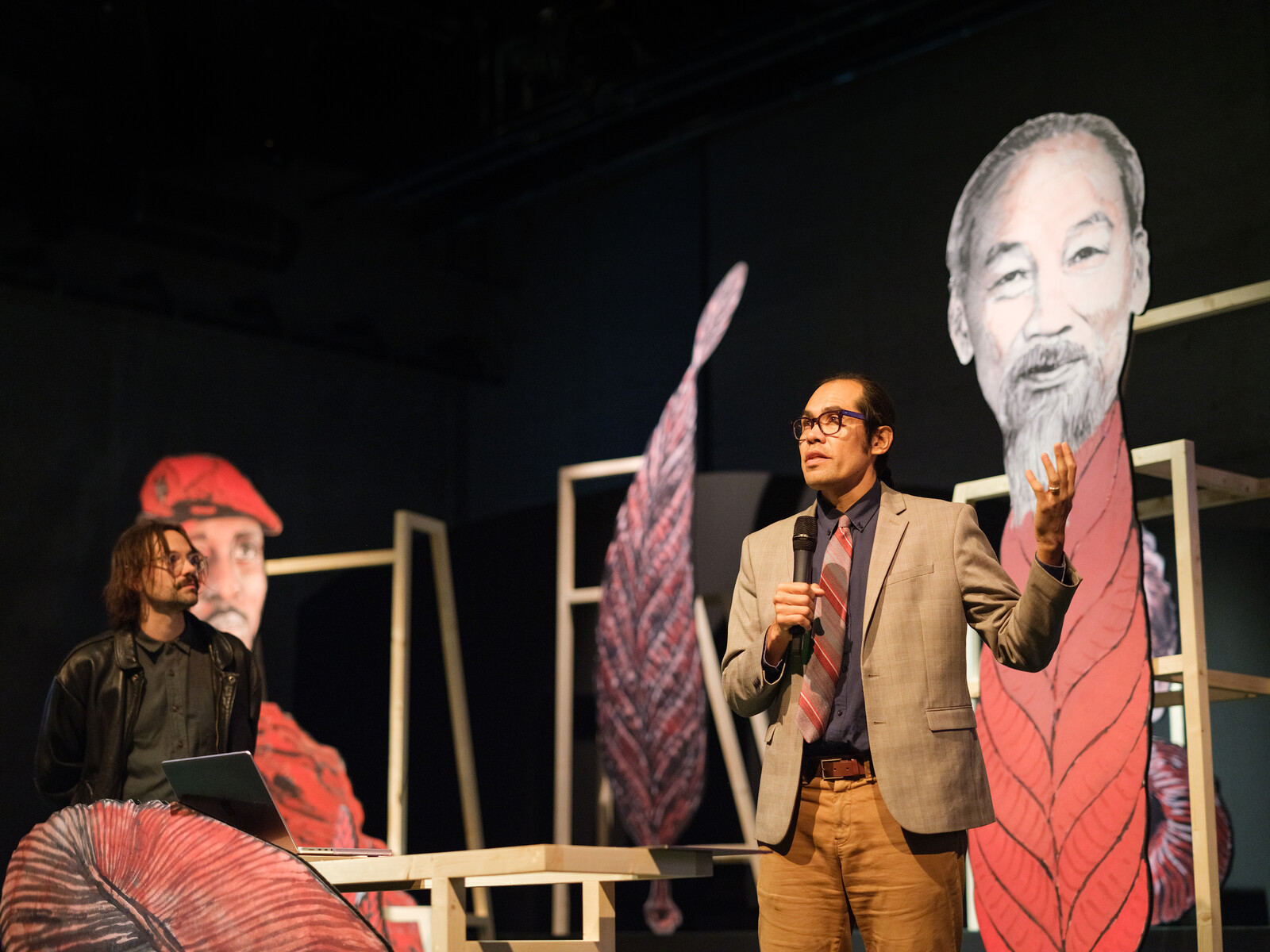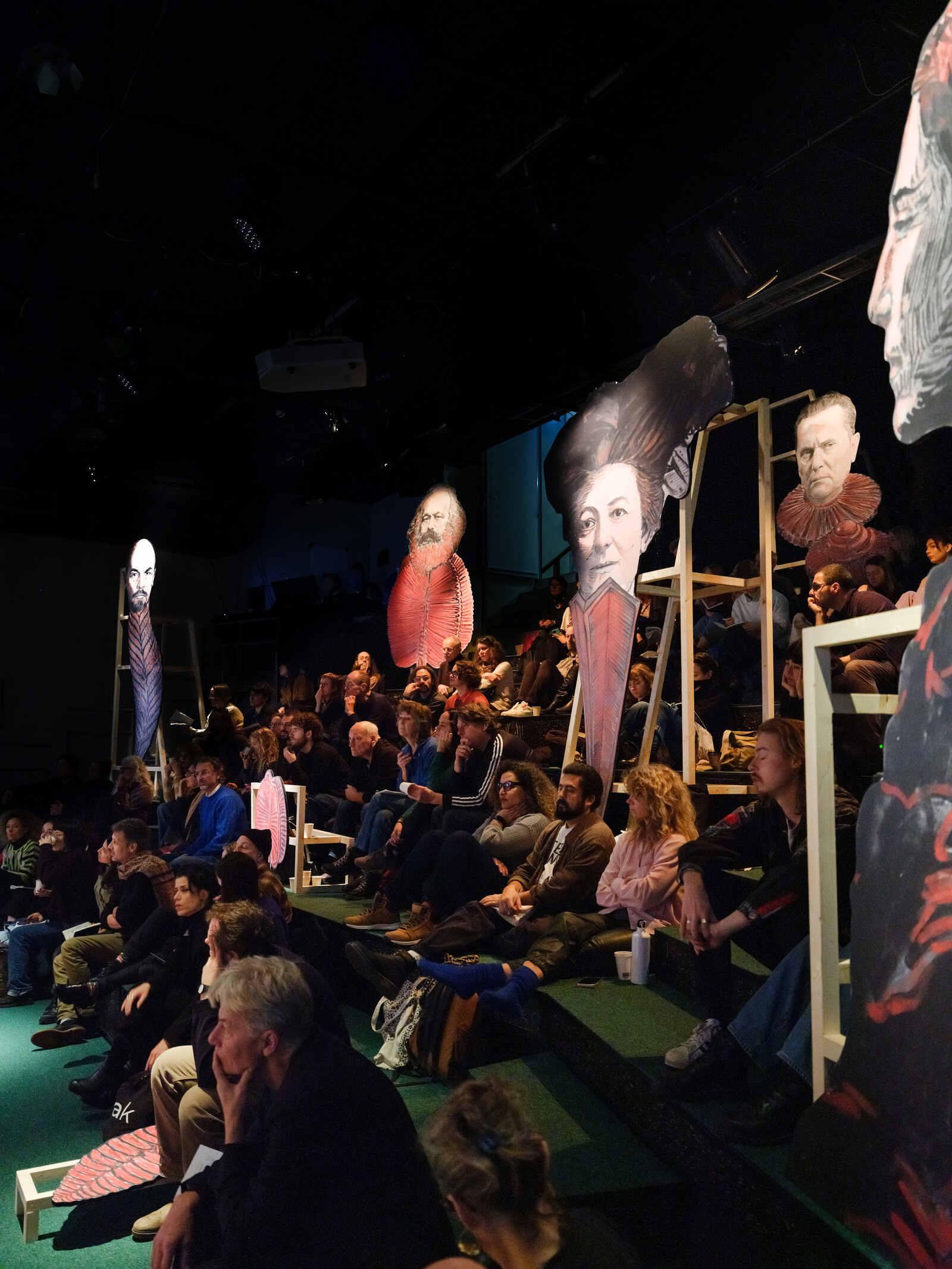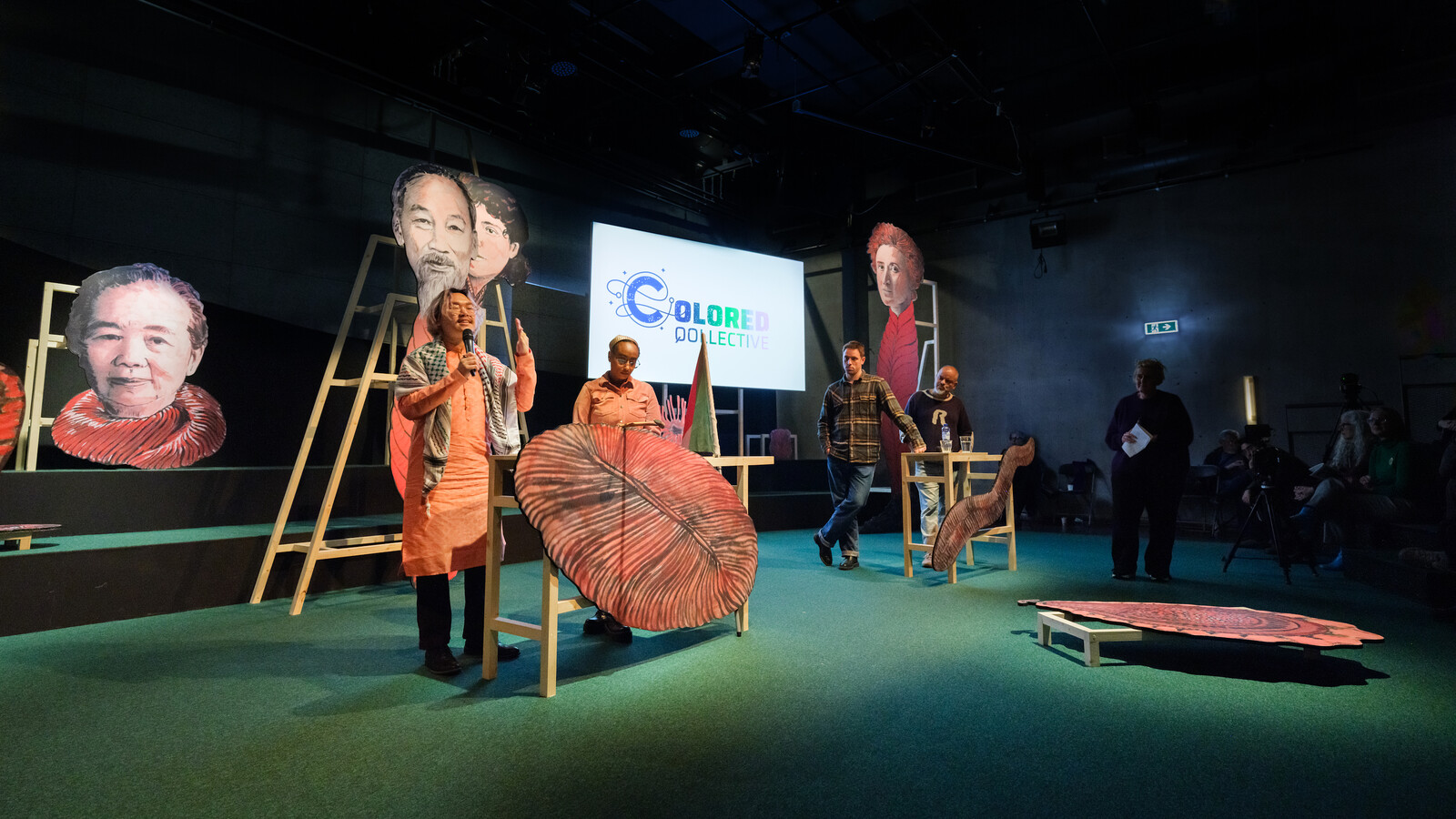The two-day Climate Propagandas Congregation was marked by urgency. Organized by Basis Voor Actuele Kunst (BAK) and artist Jonas Staal, it was the final event before BAK’s defunding by the Utrecht municipality and Dutch Council for Culture, reflecting a trend of arts institutions buckling under economic and political pressures, all while western governments openly flout international law and climate change wreaks planetary havoc. Welcoming a packed audience, BAK director Maria Hlavajova described her reaction when she learned of the institution’s fate: “The question spinning in my head, ‘How can we be more?,’ filled me with a sense of possibility, against all odds.”
That unshakable hope mirrored the will of artists, activists, cultural workers, theorists, and organizers who gathered in an aqua-carpeted “immersive diorama” to imagine ways of propagating radically egalitarian futures in an increasingly asymmetric present. Designed by Staal to invoke the Neoproterozoic Era’s Ediacaran period, described by geologist Mark McMenamin as a “pre-socialist socialist ecology,” giant painted biota adorned wood-frame podiums and stands around the auditorium, with larger specimens bearing the heads of historical revolutionaries like Ho Chi Minh, Eleanor Marx, and Thomas Sankara, to visualize the deep time of collective struggle.
As noted in Staal’s 2022 video essay 94 Million Years of Collectivism, narrated by “Proletgeologist” Vincent W.J. van Gerven Oei, ostensibly an expert in the Ediacaran’s “unique non-predatory cooperative ecology,.” The Ediacaran was only formally recognized in 2004 to have preceded the much-shorter Cambrian era, which historically defined a Darwinian framework of cutthroat survival: a mythology naturalizing capitalism as inherent to life, the video states, with collectivist histories framed as “utopian glitches.” Breaking down this toxic fable was the order of day one, “Propagating Necrospheres,” which unpacked the climate propagandas of various political persuasions, starting with liberalism.
“The first thing about liberal propaganda is to recognize that we are already brainwashed,” began law professor Radha D’Souza, who outlined five foundational liberal fictions: the nature-people divide; the two-faced state comprising democracy and security; the fallacy of legal personhood, by which a corporation has the same rights as a natural person; and the idea that science and technology will solve all the world’s problems, nature’s vital regenerative processes be damned. D’Souza’s fifth myth was in fact a truth: as Nazi propagandist Joseph Goebbels once said, good propaganda should never lie but “decide what to tell and what not to tell,” highlighting the omissions that governments and state media, whether liberal or fascist, make to gaslight populations into manufactured consent.
Refuting such tactics, T.J. Demos pulled back the curtain on twenty-first century Israeli-American libertarianism in the next talk, where “total freedom” has translated to absolute impunity. Confronting the genocide in Gaza perpetrated by an “apartheid democracy” founded on a “hundred years war of violent settler colonial eliminationism” in Palestine, Demos mapped the links between Lavender, the AI-powered targeting program used to execute the carpet bombing of Gaza, Palantir, the American data-mining company with CIA ties, Amazon web services, Israel’s NSO Group, Pegasus spyware, and the NSA.
For Demos, Israel’s “algorithmic genocide”—which hastens ecocide and generates obscene profits for Israeli weapons manufacturing—is “part of techno-libertarianism’s ‘world-ending project.’” Cue “Counter-Power: Propagating Climate Justice from the Netherlands,” a galvanizing panel of young collectives in the Netherlands sharing their work, including True Counterpower, which emerged out of a series of gatherings for activist groups at the Van Abbemuseum; Sudanese Refugee Collective, which supports relief efforts in Sudan amid its brutal war, and asylum seekers and refugees; Colored Qollective, a foundation run by and for the racialized queer community; Woonopstand, a coalition of movements, action groups and organizations confronting housing insecurity in the country; and XR Justice Now, which connects climate justice with the fight against global oppression.
All of which set the tone for day two, “Propagating Biospheres,” which outlined solid (read: actionable) tactics to re-establish a politics of life in a deadly present. Setting the context was Progressive International’s Varsha Gandikota, who highlighted the consolidation of global power through the international legal system with recent case studies. Take Honduras, whose government was sued in December 2022 by Próspera ZEDE, a Peter Thiel-backed endeavor to establish an independent libertarian charter city on the island of Roatán, after the city was declared unconstitutional, under a widely abused international law enabling foreign investors to bring arbitration claims against states.1
For Gandikota, whenever the people of the Global South attempt to reclaim their trade, land, or institutions—including those ostensibly created to protect the so-called international community, like the ICJ and ICC—“punishment comes swiftly and brutally.” Describing an international system designed to keep the Global South under the yoke of northern dominance, where “every climate question is a question of war,” Gandikota called for bold and creative transnational action like Make Amazon Pay. This global campaign, which unites some 80 organizations, more than 400 parliamentarians, and thousands of supporters worldwide, has organized global strike action on Black Friday since 2020. “There’s something […] joyful when you do this kind of ambitious, somewhat audacious, maybe even crazy, transnational organizing,” Gandikota noted.
Red Natural History fellow Andrew Curley and Steve Lyons of Not an Alternative amplified the importance of generating new alliances, by contextualizing natural history as a site of “struggle between two incommensurate projects of worldmaking”—one governed by the capitalist logic of extraction and enclosure, and the other relating to “a world in common” organized “around the reproduction of collective life.” Tapping into red as a color tying communist, socialist, and Indigenous traditions of resistance, Red Natural History stands for the latter world, and is concerned with alliances based not on common or intersecting identities, but on a shared obligation to collective life.
As Lyons underlined, natural history is neither neutral nor inherently colonial, but rather a site “to struggle over, adapt, and mobilize the resources and institutions at our disposal, as means to an emancipatory end.” This tactical and realist approach defines spaces like BAK and practices like Staal’s, which are concerned with growing an anti-capitalist cultural front strong enough to not only withstand the forces of global capitalism, but also transmute its energies to serve radically imaginative—or, to quote Gandikota again, “audacious”—goals.
With its choreography of panels, performances, and talks that carried audiences through an intensive two-day meeting defined by a sense of embodied rhythm and purpose, the impact of transdisciplinary, transcultural, and transpolitical gatherings like this cannot be overstated. Take Urok Shirhan’s stunning performance Every Day Things Disappear, delivered on each day: an oral history of an occupied land subjected to the systemic removal of its freedoms, which culminated in Shirhan, an impressive vocalist, singing a Palestinian song performed by women during the British colonial occupation: a haunting secret code, where extra letters embedded into each word transmitted messages to imprisoned family and friends amid the early years of Palestinian resistance. Or the rituals staged each day by the Laboratory of Insurrectionary Imagination, the second inviting audiences to catch and release a bouquet of leaves to celebrate small victories within collective struggle, over a map of ZAD de Notre-Dame-des-Landes, a “Zone to Defend” that withstood attempts to develop an airport since 2010, with efforts including 60,000 people dancing on a motorway forcing the project’s abandonment in 2018. In both cases, art is a tool for grounded emancipatory struggle: a clear position in the war over who and what gets to live, and how, that is well underway.
Investor-state dispute settlement, or ISDS, has long been abused. In 2001, when Ecuador ordered Chevron to pay $18.2 billion compensation for 30 billion gallons of toxic waste and crude oil dumped into the Amazon rainforest over twenty years by Texaco, Chevron used ISDS to overturn the order.



